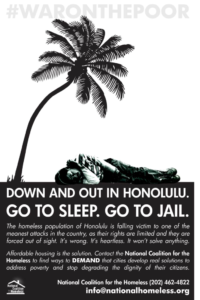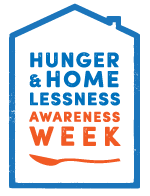 Each year, we try to choose one policy issue as an advocacy theme for Hunger & Homelessness Awareness Week. For the past couple years, our theme has been the criminalization of people experiencing homelessness.
Each year, we try to choose one policy issue as an advocacy theme for Hunger & Homelessness Awareness Week. For the past couple years, our theme has been the criminalization of people experiencing homelessness.
In recent years, communities large and small have made it a crime to not have a stable place to call home. Many cities have made a large number of activities illegal, including:
- Sharing food with people experiencing homelessness in a public space;
- Sitting in a public space;
- Laying down in a public space;
- Setting up a tent on public property; and
- Panhandling.
When a person experiencing homelessness commits any of these life-sustaining acts, they may face a fine or even jail time.
These issues have fundamental implications for us all. There are many ways to address criminalization in your community. The first thing you should do is to educate yourself on the laws in your community. This can be done by reaching out to local service providers, who will usually be familiar with any local laws that affect people who are experiencing homelessness. You can also call your local parks and recreation department to ask about any ordinances that relate to camping or to sharing food with people experiencing homelessness.
Once you know which laws are on the books in your community, you can hold educational events to raise awareness about this problem. Some examples:
- Holding a rally or a march in front of your city hall or state house;
- Collecting petition signatures from your community about overturning a particular ordinance; or
- Holding a sleep-out in front of your local legislator’s office to address a camping ordinance.
These are just a few options for ways to address this very important issue. When the most vulnerable members of your community are targeted just for trying to survive, we must all speak out to overturn this injustice.
